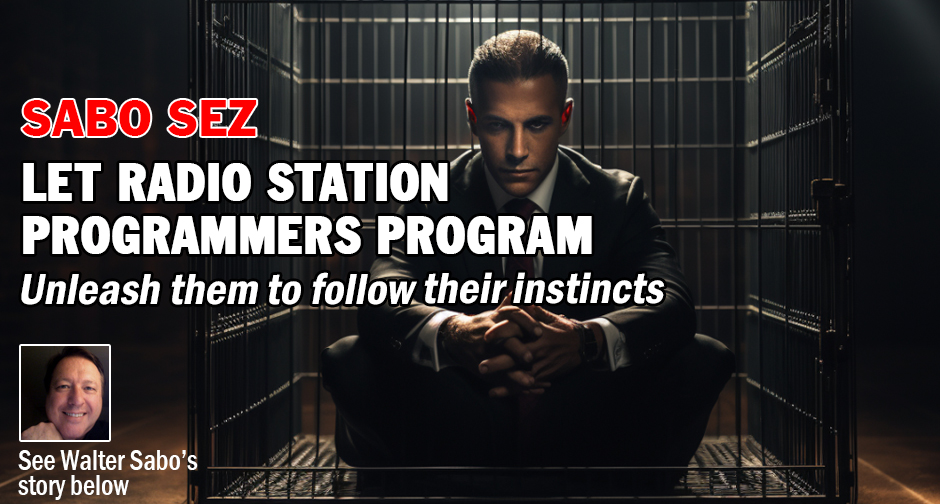By Walter Sabo
Consultant, Sabo Media
A.K.A. Walter Sterling
Radio Host, Sterling On Sunday
Talk Media Network
The creeping culture of sales-determines-all has brought the industry to this moment of despair. The selling culture has failed the medium. It is time to, once again, segregate the sales and programming departments. Take the budgets away from the program directors and inspire them to create exciting UNPREDICTABLE programming.
Earnings calls for most radio companies were held this week. Not pretty. Declarations of the demise of radio are constant, emotional, and desperate. Bleak conditions in the radio industry have occurred before. A review of past crises and how they were overcome is constructive, urgent, and essential.
For example, in 1952, network TV was launched and showed signs of success. NBC, ABC, and CBS moved their money from radio to TV. Longform radio shows were cancelled leaving stations across the country with a problem. At the time, most radio stations were small shops, usually family-owned, therefore the need to add hours of local programming was a financial challenge. The solution was presented by a programmer.
Todd Storz’ family owned stations in Omaha, Kansas City, Minneapolis, New Orleans, St Louis and Oklahoma City. He was young and obsessed with radio. His stations were losing money and the future, without network show blocks, was uncertain. Todd ate at a diner daily and noticed that even after it closed, the waitresses put their own money in the jukebox to hear the same songs they had heard all day. Hit after hit. Todd created a list of the top 40 songs, built a production sound and put it on his Omaha station. The station was #1 overnight. His top 40 format was aired on his owned stations with the same results.
Ruth Meyer was the program director of WMCA, New York where she established the GOOD GUYS dynasty. Before WMCA Ruth was the PD of Storz’s station in Kansas City. I asked her who did what at Storz and she said, “It was all Todd.” Todd was a programmer who never spent a day in sales. Storz’s programming idea changed and, yes, saved the industry.
When Todd died at 38 years of age his father – a businessman – took over the company. After Todd’s death, the stations died too. Why? Storz station manager Deane Johnson explained, “Todd’s death [and the control of the radio stations falling to Todd’s father] brought about a shift from a ‘programming company’ to a ‘money company.’”
Radio’s next challenge was FM. It is a popular myth that the shift from AM listening to FM was driven by the higher quality of the FM signal. FM’s signal had been available since 1948. No one listened.
You don’t go to iMAX to watch the huge, superior white screen. You go to watch a movie on the huge superior white screen. When the FCC mandated an end to AM/FM simulcasts, the general managers had no idea what to do and isn’t it time for golf?
Obsessed, very young radio fanboy programmers such as Michael Harrison and Allen Shaw joined with frustrated senior programmers like B. Mitchel Reed, Scott Muni, Murray the K and Tom Donahue to EXPERIMENT with new programming techniques. They imagined and implemented progressive rock, free-form, album rock. THEN the crowds came to FM to hear exciting UNPREDICTABLE programming.
In 1966, Tom O’Neil, the founder/chairman of RKO General owned many money-losing, major market stations. The solution? Better sellers? Better sales training? A sales master course? No. The answer was Bill Drake. O’Neil hired Bill Drake and allowed him to create exciting UNPREDICABLE programming. Drake’s programming saved many RKO stations and was copied by hundreds of stations across the country. Drake’s programming saved them, too.
ALL of radio’s challenges today can be solved with programming invented by programmers free to program. Enough with “it’s not in the budget.” Enough with “it will bring in money.” Enough with “it’s good for sales.” Enough with talent having to generate half their salary in billing to be retained. Enough!
Unleash today’s program directors to follow their instincts, their facts and no more having to check with corporate. Why? Because checking with corporate hasn’t worked. Checking with corporate stops the flow of ideas, it freezes them in time. Radio is live, in the moment. When radio programming is frozen in time it MUST fail. Give up corporate engagement. Let programmers surprise you.
To quote a mentor, ABC Radio Network’s VP Dick McCauley (a sales guy), “A great salesperson is one who has a great product.” He said it a lot.
Walter Sabo was the youngest executive vice president in the history of NBC. He was the programming consultant to RKO General longer than Bill Drake. According to a Sirius corporate EVP, “Sirius exists because of what Walter Sabo did.” He hosts a Talk Media Network radio show as Walter M. Sterling, “Sterling on Sunday.” Find out more here: www.waltersterlingshow.com Contact him at walter@sabomedia.com or 646.678.1110
Share this with your network
 Commerce vowed to sue the FTC to block the proposal, calling it ‘an unlawful power grab’ in a statement shortly after the vote. The chamber, as well as the two dissenting [FTC] commissioners, has argued that the FTC doesn’t have the authority to address this issue and that it should be left to the states.” The Times piece notes that the rule becomes law 120 days after being published in the Federal Register – meaning sometime in late August – but that legal challenges could block or delay the change. In the radio industry, most on-air talent, programmers, and sales staff who work under written contracts have a noncompete clause that prevents them from working “across the street” usually for six months. If this new policy stands, it will be a monumental change for radio companies. Read the Times story here.
Commerce vowed to sue the FTC to block the proposal, calling it ‘an unlawful power grab’ in a statement shortly after the vote. The chamber, as well as the two dissenting [FTC] commissioners, has argued that the FTC doesn’t have the authority to address this issue and that it should be left to the states.” The Times piece notes that the rule becomes law 120 days after being published in the Federal Register – meaning sometime in late August – but that legal challenges could block or delay the change. In the radio industry, most on-air talent, programmers, and sales staff who work under written contracts have a noncompete clause that prevents them from working “across the street” usually for six months. If this new policy stands, it will be a monumental change for radio companies. Read the Times story here.



 A shocking number of highly qualified broadcasters have lost their jobs. The venture capitalists that financed the big radio companies are the people who should be fired, but that’s the next column. Let’s get you a job.
A shocking number of highly qualified broadcasters have lost their jobs. The venture capitalists that financed the big radio companies are the people who should be fired, but that’s the next column. Let’s get you a job.